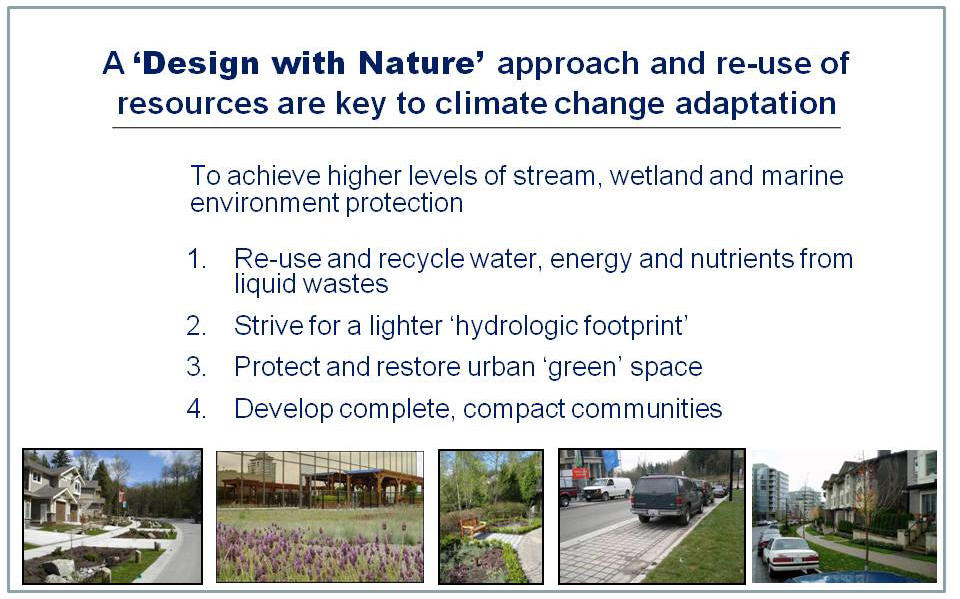Metro Vancouver Board adopts precedent-setting Integrated Liquid Waste & Resource Management Plan
Moving Beyond Regulatory Compliance
On May 21, the Metro Vancouver Board took a giant step forward when it adopted the Integrated Liquid Waste & Resource Management Plan, completed in November 2009. The centrepiece of the plan is the implementation strategy for replacing the ~50-year old Lions Gate and Iona Island primary sewage plants with advanced treatment facilities. The total cost for the two is an estimated $1.4 billion.
To view the Board agenda for the May 21 meeting, and the Metro Vancouver staff recommendation, click here.
To download a copy of the supporting staff report, click on The Integrated Liquid Waste & Resource Management Plan Secondary Treatment Timelines
The Goal: Achieve the Sustainable Region Vision
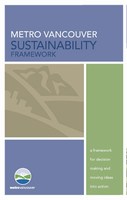 Two years in the making, the Plan establishes the framework for moving beyond regulatory compliance to transitioning Metro Vancouver to an approach where management of liquid discharges and rainwater resources is planned and implemented within a broader, sustainability framework.
Two years in the making, the Plan establishes the framework for moving beyond regulatory compliance to transitioning Metro Vancouver to an approach where management of liquid discharges and rainwater resources is planned and implemented within a broader, sustainability framework.
This framework is one that is designed to achieve the Sustainable Region vision – through resource planning, recovery and management that ultimately integrates liquid and solid waste recovery, land use planning, and the built form/infrastructure.
The Challenge: How to Finance $1.4 Billion?
The stumbling block has been the question of how to fund the $1.4 billion cost in an era when senior governments are in deficit; and local governments cannot count on 3-way equal sharing of infrastructure costs with provincial and federal governments.
When the Board met in November 2009, it referred the financing question to the Finance Committee for a recommendation. Before forwarding its recommendation to the Board, the Finance Committee debated the matter at four meetings in a row in the first half of 2010.
The Solution: The Implementation Strategy
Informed and educated about liquid waste issues and implications by the advisory Liquid Waste Management Reference Panel, the Finance Committee did its due diligence and crystallized an implementation strategy that had region-wide support when the Board voted to adopt it on May 21, 2010.
The implementation strategy encompassed two key and interconnected areas: Roles and Responsibilities of all stakeholders, including homeowners; and Financial Plan, including impact on homeowners.
The central issue has been the timeline for replacing Lions Gate and Iona, and the desire versus reality of constructing both within 10 years. The plan adopted by the Board commits the region to completing Lions Gate by 2020, and Iona Island as soon as possible after 2020. In the meantime, Metro Vancouver will be proactive and will start the conversation about HOW the three levels of government can work together for the common good.
Next Steps in the Process
Now that the Board has adopted the regional plan, the next step is sign-off by the Councils of the member municipalities. After that, the plan will be submitted to the Minister of Environment for his approval. At that time and milestone point in the process, the plan becomes a legally binding commitment.

What was said at May 2010 Board Meeting
“There was lots of theatre at the May 21st meeting of the Board, and for a while it was not clear how the final vote would go,” states Kim Stephens, Chair of the Reference Panel. He attended the meeting as an observer.
 “But there was a wonderful climax; the motion to adopt the plan passed with only two dissenting votes, with those two Directors simply wanting the Board to commit to go even faster,” reports Johnny Carline, Chief Administrative Officer of Metro Vancouver.
“But there was a wonderful climax; the motion to adopt the plan passed with only two dissenting votes, with those two Directors simply wanting the Board to commit to go even faster,” reports Johnny Carline, Chief Administrative Officer of Metro Vancouver.
Richmond Challenged Vancouver
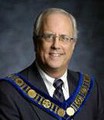 “Richmond Mayor Malcolm Brodie, Chair of the Finance Committee, had challenged the City of Vancouver to walk the ‘greenest city in the world’ talk and lead the charge for accelerated construction of Iona Island. Richmond Director Harold Steves then went further than Mayor Brodie with a ‘greenwash’ comment that was quite pointed. They were both quite passionate with their calls for action NOW,” continues Kim Stephens.
“Richmond Mayor Malcolm Brodie, Chair of the Finance Committee, had challenged the City of Vancouver to walk the ‘greenest city in the world’ talk and lead the charge for accelerated construction of Iona Island. Richmond Director Harold Steves then went further than Mayor Brodie with a ‘greenwash’ comment that was quite pointed. They were both quite passionate with their calls for action NOW,” continues Kim Stephens.
 “Harold Steves was spell-binding when he described the 20 square mile environmental dead zone in the Sturgeon Banks area that had resulted from Vancouver’s sewage. He reviewed the 50-year history of the Iona Island treatment plant and described it as a threat to the Fraser River salmon fishery. Three times he said ‘don’t greenwash Vancouver by postponing Iona’. He had an impact because he provided examples that people can understand.”
“Harold Steves was spell-binding when he described the 20 square mile environmental dead zone in the Sturgeon Banks area that had resulted from Vancouver’s sewage. He reviewed the 50-year history of the Iona Island treatment plant and described it as a threat to the Fraser River salmon fishery. Three times he said ‘don’t greenwash Vancouver by postponing Iona’. He had an impact because he provided examples that people can understand.”
“Vancouver rose to the challenge and moved an amendment to the motion, an amendment that embraced the principle of moving aggressively forward to build both Lions Gate and Iona Island as fast as possible.”
 “Director Raymond Louie, Vancouver’s representative on the Finance Committee, said ‘let’s go for it today’ and ‘the City of Vancouver wants to move in this direction’. Mayor Gregor Robertson then said ‘we commit to the principle of dealing with sewage’. He also emphasized that the senior government funding structure needs to be reformed.”
“Director Raymond Louie, Vancouver’s representative on the Finance Committee, said ‘let’s go for it today’ and ‘the City of Vancouver wants to move in this direction’. Mayor Gregor Robertson then said ‘we commit to the principle of dealing with sewage’. He also emphasized that the senior government funding structure needs to be reformed.”
 “The amendment by Vancouver really stirred the debate. The City of Burnaby directors then led a charge against the amendment. Mayor Derek Corrigan made an impassioned speech about cost-sharing and fiscal responsibility. ‘Metro Vancouver is about financial sustainability, not just being green’, he said. ‘Until there is a commitment of senior government funding, take the prudent route,’ he cautioned.”
“The amendment by Vancouver really stirred the debate. The City of Burnaby directors then led a charge against the amendment. Mayor Derek Corrigan made an impassioned speech about cost-sharing and fiscal responsibility. ‘Metro Vancouver is about financial sustainability, not just being green’, he said. ‘Until there is a commitment of senior government funding, take the prudent route,’ he cautioned.”
Rebuild the Fraser River Fishery
“When the smoke cleared, Johnny Carline came up with language that allowed everyone to save face while having their positions on the record. Basically they found a way of ‘clearly signalling the Board’s expectation that the senior governments will come to the table with funding’ was the way Johnny Carline expressed it.”
 “Just before they had the final vote, Board Chair Lois Jackson called for development of a ‘senior government communication strategy’ which would include a ‘standard letter’. She challenged all the Directors to get the Metro Vancouver message across at any and every opportunity when there is contact with federal and provincial representatives.”
“Just before they had the final vote, Board Chair Lois Jackson called for development of a ‘senior government communication strategy’ which would include a ‘standard letter’. She challenged all the Directors to get the Metro Vancouver message across at any and every opportunity when there is contact with federal and provincial representatives.”
“Earlier, Mayor Brenda Broughton of Lions Bay had a great rallying cry when she said ‘we must make it clear to the federal government that this region is committed to Canada to rebuild the Fraser River fishery because that is what is at stake’.”
Links to previous stories on Water Bucket
Metro Vancouver Reference Panel presents Final Report on region’s Liquid “Resource” Management Plan (July 2009)
Metro Vancouver Reference Panel applauds region’s “Integrated Liquid Waste & Resource Management Plan” (December 2009)
Alignment with the “Canada-wide Strategy” establishes timeline for new treatment plants in Metro Vancouver (December 2009)
Metro Vancouver considers financing options to pay $1.4B cost for two replacement sewage treatment plants (January 2010)
Metro Vancouver wrestles with the challenge of how to finance the $1.4B cost for two sewage treatment plants (March 2010)
Reference Panel provides Perspective
 “The focus of the Board on May 21 was solely on the END-OF-PIPE part of the Plan. From the beginning of our involvement two years ago, the Reference Panel has placed equal importance on what happens ON THE LAND, AT THE SOURCE. That message still needs to be further communicated to….and understood by….the Board and the municipalities,” emphasizes Kim Stephens, Chair.
“The focus of the Board on May 21 was solely on the END-OF-PIPE part of the Plan. From the beginning of our involvement two years ago, the Reference Panel has placed equal importance on what happens ON THE LAND, AT THE SOURCE. That message still needs to be further communicated to….and understood by….the Board and the municipalities,” emphasizes Kim Stephens, Chair.
On the Land, At the Source
“The elephant in the room is the ‘ISMP issue’ which we flagged in our Final Report, released in July 2009. When the Reference Panel first reported out to Metro Vancouver regional politicians in July 2008, we identified the Integrated Stormwater Management Plan process as the ‘elephant in the room’ for the region. We came to this 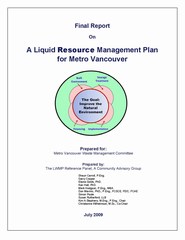 conclusion because 130 plans ‘would potentially result in an aggregate unfunded liability that could easily equal the $1.4 billion cost of sewage treatment ….the issue is known, but there seems to be a reluctance to ‘tell it like it is’.”
conclusion because 130 plans ‘would potentially result in an aggregate unfunded liability that could easily equal the $1.4 billion cost of sewage treatment ….the issue is known, but there seems to be a reluctance to ‘tell it like it is’.”
“This finding led the Reference Panel to recommend that Metro Vancouver municipalities ‘re-focus Integrated RAINwater/Stormwater Management Plans on watershed targets and outcomes so that there are clear linkages with the land use planning and development approval process’.”
“Connecting people to the landscape is essential if we are to change the land ethic for the better, and achieve the goal of ‘watershed health’. Land and water are not silos. What we do on the land and to the land impacts on water, whether we are talking about water supply or drainage runoff.”
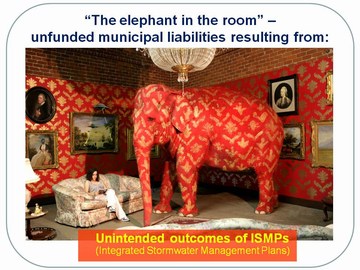
Creating Our Future
“Embracing a ‘design with nature’ way-of-thinking and acting will help the region achieve the vision for managing liquid discharges and rainwater as resources. The ‘design with nature’ paradigm captures the essence of climate change adaptation, which is essentially about collaboration at the community scale. If Metro Vancouver municipalities can show how to get the water part right, then other parts of the regional Sustainability Framework are more likely to follow,” states our Final Report.
“When we presented our Final Report to the Metro Vancouver Waste Management Committee, we asked that the Final Report be treated as a ‘companion document’ to the regulatory document prepared by Metro Vancouver staff.”
“As we seen over this past year, the 19 recommendations by the Reference Panel are standing the test of time. The Reference Panel and Metro Vancouver staff are in alignment, and the recommendations are well-founded.”
“In summing up, the Reference Panel experience has demonstrated that major breakthroughs happen when decision-makers in government work with grass-roots visionaries in the community to create desired outcomes.”
To Learn More:
To learn more about the Reference Panel recommendations, click on Final Report on A Liquid Resource Management Plan for Metro Vancouver.



